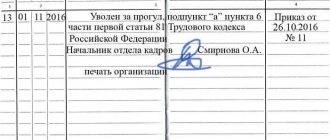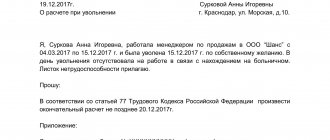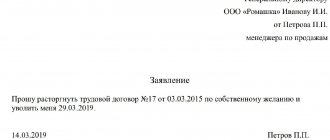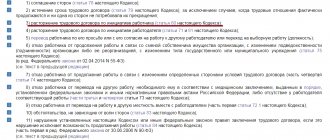Meaning of Art. 33 Labor Code
In the Labor Code of the Russian Federation (LLC), approved by the Supreme Court of the RSFSR on December 9, 1971 (or the old Labor Code), art. 33 played an important role because it contained a list of grounds giving the organization’s administration the right to initiate, on its own initiative, the termination of an employment contract with an employee. Most often, dismissal under Article 33 of the Labor Code meant that the employee was fired due to absenteeism or systematic disciplinary violations. This, accordingly, had a negative semantic connotation for him and subsequently served as an obstacle to normal employment.
Although the list of grounds contained in Article 33 of the old Labor Code of the Russian Federation was in fact broader and did not always imply the presence of a violation of discipline. For example, this also included layoffs due to the liquidation of an organization or due to a reduction in the number of employees.
Aiding
If the accused is charged with aiding and abetting the Criminal Code of the Russian Federation, this means that the person in every possible way helped other participants in the crime in committing it or in hiding traces that could incriminate the suspects.
The Code understands the commission of complicity if the accomplice commits the following actions:
- acquires or destroys a crime weapon;
- gives advice on concealing the offense;
- promises in advance to help in carrying out the crime;
Also, the concept of complicity can have two forms: actions, when complicity is expressed in the form of assistance in any way, or inaction, when the accomplice does not report illegal information known to him.
Proven complicity is a rather complex action in practice, since most criminal acts are qualified under the Criminal Code of the Russian Federation and are independent violations of the law.
In the Russian Federation, complicity can be proven only with very compelling reasons. In this case, the actions of the accomplice must have a specific form, that is, complicity. For example, if a person wants to commit suicide, then an accomplice should facilitate this. However, such a person may be charged with incitement to suicide if this type of crime is proven.
In America, it is much easier to accuse a person of complicity; for example, in terrorism cases, any action aimed at helping a militant, including legal assistance, is punishable under the article of complicity.
Labor legislation: changes in 2002
On February 1, 2002, the Labor Code was replaced by a new law - the Labor Code of the Russian Federation (LC RF). The need for its adoption was caused by significant changes in both the socio-political life of Russia and economic relations. In the field of labor law, changes were required mainly:
- due to the growing role of market relations in the country;
- the emergence of employers with different forms of ownership than those under which the Labor Code was created.
The new law was supposed to formulate in a new way the principles of the relationship between employer and employee, transferring their relationship into a contractual one and maximally protecting the interests of each of them.
While maintaining the continuity of many provisions of the old law (about 50%), the new Labor Code of the Russian Federation at the same time became much more detailed, in some places acquired a different content and was divided into chapters and articles in a different way. The number of the latter, in particular, has increased significantly. As a result, their numbering has changed, and Article 33 of the Labor Code of the Russian Federation no longer considers dismissal issues.
Meanwhile, workers who have not delved into the intricacies of changes in labor legislation retain the memory of dismissal under this article, so you can often hear a reference to it in conversation, implying dismissal for a disciplinary offense. Moreover, some have a note about it in their work book. Taking into account the fact that in reality a different law has long been in force, in which there is an analogue of Art. 33 of the Labor Code under a different number and with significantly changed content, it is more correct to apply a different link to the grounds for dismissal at the initiative of the employer.
Step-by-step instruction
Termination of an employment relationship at the request of the employee usually causes the least difficulties. As a rule, the parties to the contract come to an agreement and there are no conflicts between them.
However, unscrupulous employers often force employees to write letters of resignation, thereby substituting the real grounds for dismissal. In this case, the interests of the employee may suffer, and such dismissal is considered illegal. Then the court reinstates the dismissed citizen.
The step-by-step dismissal procedure is as follows:
employee submitting an application for upcoming dismissal
You need to pay attention to the end date of work indicated in the document. It is necessary to formulate this way: “I ask you to fire me on August 1”, but not “from August 1”
The date of dismissal will be the final day of work in the organization; the period between filing an application and dismissal. Typically, the law requires a two-week period; for management it is equal to a month. But if both parties do not object, this period can be reduced. The employer does not have the right to change it downward independently; issuing an order to dismiss a citizen. The order is issued on the employee’s final day of work and is presented to him for review. If the citizen so desires, he is given a copy of the order; issuing to the employee a certificate of the salary received over the last 2 years. The document is handed over to the employee on the day of his dismissal or, if this is not possible, within 3 days after his relevant application; generation of a certificate or other document with information for the Pension Fund. The law does not stipulate the exact form of the document, but the forms specified by the Pension Fund of the Russian Federation must be used; a record of the dismissal in the employee’s personal card; generation of a settlement note in relation to an employee. The document contains information about the employee, information about the period of his work and data on accruals and payments upon dismissal; full payment. All amounts must be paid to the dismissed employee on the day of termination of work. If the citizen was not at work that day, the money is issued on the day immediately following the receipt of such a request from him; entry in the work book. After entering the information, the book is issued to its owner; return to the citizen copies of the documents that he submitted when applying for a position.
Watch the video. Dismissal at will without work:
Perform on behalf of the organization actions to implement its rights and obligations arising from civil, labor, tax and other legal relations (act without a power of attorney): in the scope of the owner’s powers to own, use and dispose of the organization’s property; in the field of rights of the copyright holder of exclusive rights to the results of intellectual activity and means of individualization equivalent to them; in the area of the rights and obligations of the employer in labor relations with other employees of the organization, etc.
Alexey, good afternoon! Legally, there is no such term as “dismissal under article”.
Contents of Art. 33 in the Labor Code of the Russian Federation
Article 33 of the Labor Code of the Russian Federation in its new version moved from the section devoted to the consideration of the intricacies of the employment contract to the section devoted to issues of social partnership in the sphere of labor, and became known as “Employer Representatives”. Already from its name it is absolutely clear that regarding issues of dismissal Art. 33 of the Labor Code of the Russian Federation has nothing to do with it.
In its latest version, Art. 33 of the Labor Code of the Russian Federation consists of two parts dedicated to employer representatives in interaction:
- With own employees (their collective) when negotiating or developing (amending) a collective agreement. Here, the employer can be represented by the head of the legal entity, personally by the employer-individual entrepreneur, or by persons authorized by them for such representation. And for employers established by a state, regional or municipal body, such a representative will be the corresponding government body (Article 34 of the Labor Code of the Russian Federation).
- With groups of workers on issues (or disputes) of a collective nature related to the conclusion (change) of labor agreements, as well as when participating in the work of commissions regulating social and labor relations. Here, the interests of employers are represented by their association, formed at the appropriate level (from territorial to all-Russian). The creation of industry and inter-industry associations is also permitted.
The existence of employers' rights to association is confirmed by:
- Art. 2 of the Law of the Russian Federation “On Associations of Employers” dated November 27, 2002 No. 156-FZ;
- clause 2 art. 7 of the Law of the Russian Federation “On the Russian Tripartite Commission for the Regulation of Social and Labor Relations” dated May 1, 1999 No. 92-FZ.
Responsibility for violation of employee rights
Since violations by the employer during the dismissal process are far from uncommon, it is better to familiarize yourself in advance with the content of the legal norms in this area.
Know! To avoid being forced to resign at personal request, employees need to know their rights, then they will be able to prevent their violation.
The Labor Code not only regulates the procedure itself in detail, it also provides for liability for violations in the field of labor relations.
The application of sanctions is determined by more than one Labor Code of the Russian Federation; punishments for offenses in this area are also provided for in the Code of Administrative Offenses of the Russian Federation.
Legal norms and types of sanctions:
- penalty (penalty) for delay in payment in the amount of 1/150 of the rate of the Central Bank of the Russian Federation (Article 236 of the Labor Code of the Russian Federation);
- fine or ban on holding certain positions for 1–3 years (Article 5.27 of the Administrative Code of the Russian Federation).
The amount of fines varies within the following limits:
- from 1,000 rub. up to 5,000 rub. – for officials and entrepreneurs. The latter may also, as an alternative sanction, be deprived of the right to operate for a period of up to 3 months;
- from 30,000 rub. up to 50,000 rub. - for legal entities. This type of punishment can be replaced by a ban on carrying out activities for a maximum of 90 days.
If the offense is very serious and committed by employees of state or municipal bodies, as well as by the top officials of the enterprise (manager and his deputy), a ban on holding such positions for 1 to 3 years may be applied.
The severity of the punishment depends on the seriousness of the illegal act. If a citizen was forced to resign of his own free will, he has the right to protect his interests in court. Filing a claim does not require payment of a state fee.
Watch the video. How to withdraw your resignation letter:
Analogue of Art. 33 Labor Code in the Labor Code of the Russian Federation
Contents similar to Art. 33 of the Labor Code, in the new law acquired Art. 81 of the Labor Code of the Russian Federation, which reflected a clarified and expanded (in comparison with the Labor Code) list of grounds for dismissal related to the employer’s initiative.
Changes in content were reflected not only in a significant increase in the number of reasons for dismissal (13 versus the previous 8), but also in the expansion of the text of explanations for them. At the same time, 2 main provisions present in Art. 33 of the Labor Code, transferred to Art. 81 Labor Code of the Russian Federation:
- In some situations, the employer is required to try to employ the employee before dismissing him;
- Dismissal caused by the initiative of the employer is prohibited while the employee is on sick leave or on vacation.
To learn about possible combinations of dismissal and illness situations, read the article “Is it possible to quit while on sick leave?”
Punishment for the organizer
The organizer of a crime is a person who is active in everything related to preparation for committing an offense.
Such an event participant can have two roles:
- direct participant;
- The role of only the organizer.
With direct participation, the criminal carries out the organization primarily on his own, develops a plan for the proposed act, determines the role of each participant, if there are several of them, and also determines his role in participation. If the organizer only intends to develop a plan, then he does not participate in the process itself, but at the same time manages the process completely, communicating with other participants in ways available to him.
The punishment of this accomplice will be determined in accordance with the obligations assumed, since offenses may vary in severity, but the terms of the name are subject to change.
Also, when assigning a measure of responsibility, the identity of other people who are part of the company that committed the offense is taken into account:
- Minors.
- Incapacitated.
- Mentally ill, but not incapacitated.
In this case, the organizer, even if he did not participate in the crime, is recognized as the direct perpetrator, since he influenced other accomplices thanks to his strength, both physical and intellectual, and also suppressed the weaker ones and essentially forced or incited them to act as he pleased.
List of reasons for dismissal under Art. 33 Labor Code
Art. 33 of the Labor Code, the dismissal of an employee at the initiative of the employer was associated with:
- with the liquidation of the organization or reduction of its staff (clause 1);
- inadequacy for the position held due to the level of qualifications or health status (clause 2);
- systematic disciplinary violations, expressed in failure to perform labor functions or labor regulations (clause 3);
- absenteeism, which equated to absence from work for more than 3 hours per working day (clause 4);
- an illness lasting more than 4 months in a row, unless it is maternity leave or an injury (illness) resulting from production-related factors (clause 5);
- reinstatement of an employee who previously held the position of the current employee (clause 6);
- showing up at work in a state of intoxication of any kind (clause 7);
- committing theft, the fact of which was confirmed by a decision of the court or other body that brought the employee to punishment (clause 8).
The clause about the need for an attempt at employment at the same place of work prior to dismissal related to reasons related to:
- with clause 1 - liquidation (staff reduction);
- clause 2 - inconsistency with the position;
- clause 6 - reinstatement of a previously dismissed employee.
General points of the old art. 33 Labor Code and new art. 81 Labor Code of the Russian Federation
In the new art. 81 of the Labor Code of the Russian Federation preserves the reasons for dismissal caused by:
- Liquidation (termination of activities) of the employer or reduction of its staff. At the same time, these reasons were broken down into two independent points.
- Inadequacy for the position due to insufficient qualifications. There was a requirement for confirmation of non-compliance with qualifications by the certification commission. The reason related to health status has been removed from the paragraph.
- Systematic misconduct of a disciplinary nature.
For more information about disciplinary violations, including those committed systematically, read the material “Disciplinary liability of an employee and its types.”
- Absenteeism, which is equivalent to absence from work for more than 4 hours in a row. This paragraph not only increases the length of time of absence, but also details the definition of absenteeism and clarifies the place in relation to which absence from work can be discussed.
- Appearing at work in a state of intoxication of any kind.
- Committing theft, the fact of which is confirmed by a decision of the court or other body that brought the employee to punishment. This reason is supplemented by such grounds as intentional damage to property, expressed in its waste or intentional damage (destruction).
Accordingly, the requirement for the employer to attempt to employ employees before layoffs caused by a reduction in the number or insufficient qualifications of employees remains in force.
Innovations Art. 81 of the Labor Code of the Russian Federation in comparison with Art. 33 Labor Code
Not preserved in Art. 81 of the Labor Code of the Russian Federation, the grounds present in Art. 33 of the Labor Code, in the new law were moved to other articles:
- inadequacy for the position due to health conditions was transformed into the basis specified in paragraph 8 of Art. 77 of the Labor Code of the Russian Federation (impossibility of selecting a job that corresponds to the state of health, or the employee’s refusal to do such work);
- a long-term illness can now, depending on the situation, lead to dismissal either under clause 8 of Art. 77 of the Labor Code of the Russian Federation (impossibility of selecting a job that corresponds to the state of health, or the employee’s refusal to do such work), or under clause 5 of Art. 83 Labor Code of the Russian Federation (complete inability to work);
- the reinstatement of an employee who previously worked in the place of the current employee has moved to the list of grounds independent of the will of the parties (Clause 2 of Article 83 of the Labor Code of the Russian Federation).
The new grounds that appeared in Art. 81 Labor Code of the Russian Federation, steel:
- Change of owner of a legal entity (clause 4) as a basis for dismissal of the head of this legal entity, his deputies and the chief accountant.
- A one-time gross disciplinary offense (clause 6), the list of which included absenteeism, showing up at work in a state of intoxication of any kind, and committing theft (embezzlement, deliberate damage or destruction of property). In addition, the following reasons were included here: disclosure of any of the secrets that turned out to be known to the employee;
- violation of labor protection requirements, leading to serious consequences or creating a threat of them.
- a decision made by the owner in relation to the head of the legal entity (clause 2 of Article 278);
Some of these grounds (clauses 7, 8, 10, 13 of Article 81 of the Labor Code of the Russian Federation) were previously present in Art. 254 of the Labor Code and were described as arising under certain conditions.
Available in Art. 33 of the Labor Code clarifications on an attempt at employment prior to dismissal in some cases, as well as on the prohibition of dismissal during illness and vacation in Art. 81 of the Labor Code of the Russian Federation is supplemented with conditions on the need:
- conducting certification of employees in accordance with labor legislation;
- making every effort to employ an employee before his dismissal, including offers of a lower position and work in another area;
- compliance during the liquidation of a branch with the rules applied during the liquidation of a legal entity;
- non-application of dismissal later than 1 year from the moment of discovery of such offenses as loss of trust in connection with guilty actions in relation to property (clause 7 of article 81 of the Labor Code of the Russian Federation) and an immoral act of a teacher (clause 8 of article 81 of the Labor Code of the Russian Federation), if they committed not at work or not in connection with work functions.
Executor
This type of accomplice includes the person who carries out the main harm, that is, the objective side of the offense.
To recognize a person as a performer, he must meet certain points, namely:
- fulfilled the objective side partially or completely;
- used by a person who has non-criminal status;
- possessed special knowledge if required.
If the perpetrator does not fulfill his functions in committing the crime, for example, when beating does not cause physical harm to the victim, then the crime will be considered imperfect.
By definition, such an offender goes into the category of accomplices, which means that aiding in the commission of a crime of the Criminal Code of the Russian Federation will be applicable to him and he will be liable under this legislative act.
If a person, in carrying out criminal intentions, uses another person who cannot be the object of a criminal conviction, then he takes full responsibility for the actions of the person not subject to criminal liability and becomes a perpetrator before the law, although in fact he may commit incitement to commit a crime (Article of the Criminal Code of the Russian Federation). finds him guilty.
The commentary to Article 33 states that when committing certain types of crimes, for example, robbery or theft of intellectual property, the perpetrator must have certain knowledge that allows him to carry out criminal intentions. If a person does not have such knowledge, then he is unlikely to be able to commit the objective side of the offense, which means his actions will be classified as other actions and attributed to other participants in the plan aimed at causing public harm.
Shift of emphasis in Art. 81 of the Labor Code of the Russian Federation in relation to Art. 33 Labor Code
The reasons for dismissal contained in Art. 33 of the Labor Code, as well as the grounds given in Art. 81 of the Labor Code of the Russian Federation, are divided into 3 groups:
- occurring due to changes in the employer's organizational structure;
- related to the employee’s guilt;
- others.
From Art. 33 of the Labor Code, accordingly, they include:
- liquidation of the employer, reduction of staff;
- disciplinary violations: systematic, absenteeism, intoxication, theft;
- inadequacy for the position held, long-term illness, reinstatement of a previously employed employee.
In Art. 81 of the Labor Code of the Russian Federation these groups include:
- liquidation of the employer, reduction of staff, change of owner;
- systematic and one-time gross violations of labor discipline, loss of trust, immoral act, guilt of the manager, concealment or distortion of information about oneself;
- inconsistency with the position held, additional grounds for the manager, other cases.
Thus, if we do not take into account those grounds that actually do not depend on the will of either the employee or the employer (long-term illness, reinstatement of a previously employed employee), then the grounds for dismissal on the initiative of the employer turned out to be supplemented by a number of reasons of a disciplinary nature (including including those that were previously completely absent from labor legislation) and motives determined by the decisions of the owner (including those that differ depending on the form of ownership).
Results
Art. 33 of the current Labor Code of the Russian Federation in its content has nothing to do with the issue of dismissal, but is associated with the article of the already canceled Labor Code, which has the same number, which directly related to the issue of dismissal at the initiative of the employer. In the current Labor Code of the Russian Federation, an analogue of Art. 33 of the Labor Code is Art. 81, significantly expanded in comparison with its predecessor.
Sources:
- Labor Code of the Russian Federation
- Federal Law of November 27, 2002 N 156-FZ
- Federal Law of 01.05.1999 N 92-FZ
You can find more complete information on the topic in ConsultantPlus. Free trial access to the system for 2 days.
Consequences: as reflected in the work book
In case of dismissal due to a “bad” article, the consequences may be different. Unfortunately, the reason for dismissal from a previous job is indicated in the work book and can complicate the search for another job.
Indicating the reason for the dismissal from the previous job will serve as a “red rag” for the HR department and the other employer. When looking for a job, a number of refusals from employers will follow, since dismissal under Article 81 of the Labor Code of the Russian Federation means that the employee did not conscientiously approach the performance of his professional duties, which is not necessary for any future employer.
Features of termination of an employment contract at the initiative of the employer in the following video:











